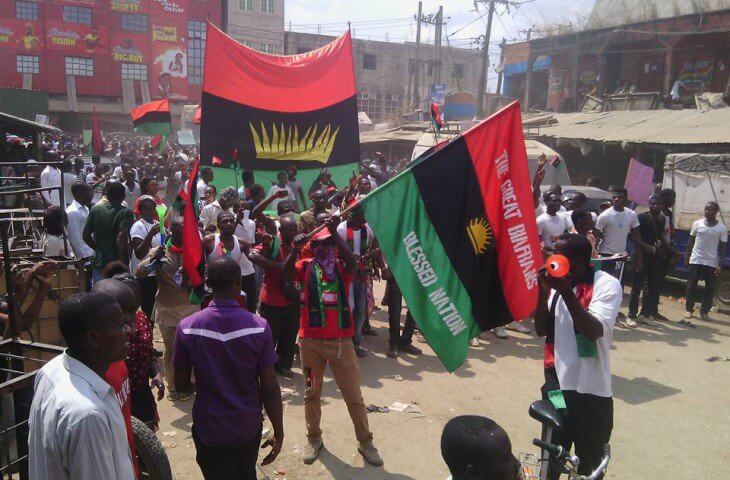The outlawed pro-Biafran group, Indigenous People of Biafra, IPOB, is a group that is most misunderstood in Nigeria. The funny thing is that some Biafrans don’t even know what the agitation group stands for, hence the misconception of their motive.
Those who do not know IPOB sometimes call the organization the Independent People of Biafra, IPOB. This is a big misunderstanding, and the misunderstanding has contributed to the hampering of the actualization of Biafra many years after the end of the Nigeria-Biafra Civil War in 1970.
Advertisement
By calling IPOB, Independent People of Biafra, instead of the Indigenous People of Biafra, creates the impression that the group is a divisive group that is obsessed with separation without a definitive cause. It also creates an erroneous impression that IPOB is borne out of spite, and that the agitators do not have a focus, hence the desire of many, especially those in the corridors of power at the centre who do not want to hear anything about Biafra after the pyrrhic civil of war of the 60s, to give the group a wrong name.
Some people still misunderstand IPOB to mean the Igbo People of Biafra. This is a gross misconception because when Biafra was declared an independent state by the late Ojukwu, it was not only Igbo people that fought the war, but all Biafrans predominantly made up of the old Eastern Region, including the present Delta State.
From the way the leader of IPOB, Nnamdi Kanu, and his fellow agitators for the Sovereign State of Biafra have been explaining those that constitute Biafra, the scope has been expanded to include some parts of Kogi, Benue, Edo and southern parts of Kaduna. Their position is that those are the marginalised people in Nigeria that share similar cultural affinity more than the rest of Nigerians.
Today, haters of Biafra want to narrow Biafra down to just the five Southeast states of Abia, Anambra, Imo, Ebonyi and Enugu, thereby excluding other states that make up the great Biafra. The leader of IPOB, Kanu, in many of his broadcast messages, and press statements being dished out by IPOB spokesman, Emma Powerful, point out that every part of Nigeria where women tie double wrappers is all Biafra, irrespective of the states they find themselves in Nigeria.
Advertisement
What this means is that IPOB is not a creation of Ndigbo, but all the people that belong to Biafra. The fact that a man from the five Southeastern states, Nnamdi Kanu, is heading the pro-Biafran group does not give it the colouration that IPOB is made for Ndigbo and for Ndigbo. After all, was it not an Igbo man, Dim Chukwuemeka Odumegwu-Ojukwu, that led Biafra to war. Other Biafrans should have daubed it an Igbo war, and left Ndigbo to fight the civil war alone.
The man that was second in command to the late Ojukwu was a Cross River man, Philip Effiong, while the man that was using radio messages to ginger Biafrans to war was Okonkon Ndem, who was also not from the present five Southeastern states. It is only when people with divisive tendencies who do not want Biafra to be a sovereign nation come up that they whip sentiments that IPOB or Biafra is the preserve of Ndigbo so that the Ibibio, Anang, Ijaw, Deltans, Efik, Isoko etc will begin to say that they are not Biafra.
Enemies of Biafra will always devise the means to balkanise Biafrans so that they will not be united in their agitation for one solid Biafra. This is why some Southsouth people would attack Asari Dokubo, a retired militant, because he said that the Niger Deltans, as they are sometimes addressed instead of Southsouth, are Biafrans.
It is imperative that the Indigenous People of Biafra, IPOB, be understood in its proper perspectives: a movement for the emancipation of the entire Biafrans, not just Ndigbo. The IPOB leader, Nnamdi Kanu, does not feel happy that some people misunderstand their vision that they are out to liberate Biafrans from Nigeria. He calls those that misunderstand him, especially Ndigbo, ‘efulefu’, base fellows.
– Eze, a national commentator, wrote from Enugu
Advertisement
Disclaimer: This article is entirely the opinion of the writer and does not represent the views of The Whistler.



